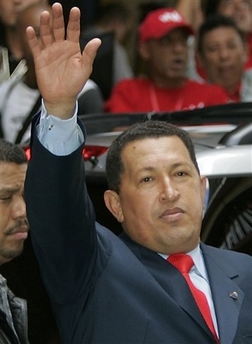Chavez snubs US overture for dialogue
(AP)Updated: 2006-12-06 11:09
CARACAS, Venezuela - President Hugo Chavez snubbed a US overture for dialogue on Tuesday, saying he is always willing to talk but doubts Washington sincerely wants to improve relations.
Chavez, who overwhelmingly won another six-year term in elections Sunday, said if the US really wants to take meaningful steps, it would halt the war in Iraq and extradite a jailed Cuban militant who is wanted in Venezuela for a 1976 airliner bombing.
"They want dialogue but on the condition that you accept their positions," Chavez said at his first news conference since Sunday's vote.
"If the government of the United States wants dialogue, Venezuela will always have its door open," he said. "But I doubt the US government is sincere."
The comments from Chavez came shortly after US Ambassador William Brownfield congratulated Venezuelans on a peaceful vote and expressed Washington's willingness to seek a less conflictive relationship with Chavez.
"The president was re-elected by the decision of the Venezuelan people," Brownfield told the Venezuelan broadcaster Union Radio. "We recognize that and we're ready, willing and eager to explore and see if we can make progress on bilateral issues."
Brownfield said the United States and Venezuela share an interest in cooperating on issues including combatting drug trafficking, international crime and terrorism, as well as trade and energy issues. "Venezuela is a partner of the United States, for geographical reasons, for historical reasons," he said.
The United States remains the No. 1 buyer of Venezuelan oil, but tensions have often precluded dialogue. Chavez accuses Washington of backing a 2002 coup against him, while US officials worry about the health of Venezuela's democracy in a government dominated by Chavez and his allies.
Chavez also said his landslide re-election victory in a vote marked by the highest turnout in years showed Venezuela supports a radical turn toward socialism.
Chavez spoke after the elections council formally declared him the winner, defeating Manuel Rosales with nearly 63 percent of the vote. Electoral officials said turnout was about 75 percent. Chavez won some 7.2 million votes out of more than 11 million cast, the results showed.
"Those who voted for me didn't vote for me. They voted for the socialist plan, to build a profoundly different Venezuela," Chavez said, praising the Rosales camp for accepting his victory. "I want to salute the responsible opposition ... It was time they assumed the attitude of true democrats."
Rosales, meanwhile, said that although the opposition suffered a setback in the vote, it has won a victory of sorts by uniting forces to challenge Chavez in the future.
"This is a political triumph in the middle of an electoral setback," Rosales said. "We are going to continue fighting."
Recent polls suggest Venezuelans hold a variety of opinions about socialism. An Associated Press-Ipsos poll last month found that 37 percent favored a socialist economic system, 22 percent favored capitalism and 33 percent preferred a mix of the two.
Eighty-four percent opposed adopting a political system similar to that of Cuba, which has become Venezuela's close ally under Chavez.
During the news conference, Chavez read a note from ailing Cuban leader Fidel Castro congratulating him on his victory. Chavez said he could tell from the signature that Castro was gaining his strength back.
On Tuesday, Cuba's Communist newspaper published a brief message on its front page that was signed with Castro's name.
"The victory was resounding, crushing and without parallel in the history of our America," read the message in the Communist Party daily Granma.
Chavez has said he plans to seek constitutional reforms to end presidential term limits and enable him to run again in 2012. Rosales pledged to fight that bid with a proposal instead to reduce terms to four years.
Chavez also has said he plans to deepen oil-funded social programs aimed at reducing poverty. He says he will fully respect private property, though he also pledged to deepen agrarian reform and has hinted he might nationalize Venezuela's largest telecommunications company.
Electoral observers from the European Union said in a preliminary report Tuesday that they backed the results of Sunday's election and that overall the vote was carried out smoothly and securely.
However, the EU mission noted a few areas of concerns, including a high participation of public employees in Chavez's campaign events, unbalanced coverage in both state and private media, and a heavy use of government advertising by Chavez, and to a lesser degree, Rosales.
Monica Frassoni, the Italian head of the EU mission, said complaints had been received of alleged pressure on public employees to vote for Chavez. She said such pressure would violate electoral laws, but the mission was not able to evaluate those complaints.
|
||
|
||
|
|

